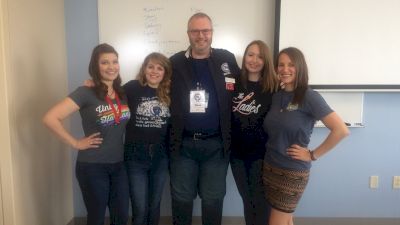From Contemporary To Barbershop: The Case For A Cappella Collaboration
From Contemporary To Barbershop: The Case For A Cappella Collaboration
Sometimes there are great lessons to be learned by reaching across the aisle—the barbershop community has so much to share.

I tried something new and it turned out even better than I could have imagined.
I have been a professional singer in contemporary a cappella and classical ensembles for well over a decade. Contemporary a cappella is quite literally my heart and soul (well, and paycheck). In that time I have worked with many barbershop groups behind the scenes and sung alongside them in shows and competitions. But never with them, until about six months ago.
After a great experience covering the Harmony, Inc. IC&C in November, I decided to join my local chorus, Bella Nova. At the first rehearsal, I was just that "FloVoice lady," but I was quickly welcomed into an intergenerational, forward-thinking chorus with immense talent and big goals. After just a handful of rehearsals, I was lucky enough to travel with the chorus to compete in the Area 3 Contest this past weekend in Binghamton, NY, where we earned second place and a ticket to Internationals in November. And I am hooked.
I affirmed quickly that, while the style of music was different, the desire to sing is universal. We all had a lot to learn from each other, but I’ll start with the lessons I learned from them.
Alto lines are the baby sister to a good baritone part.
As a classical alto and a contemporary arranger, I love a good crunchy chord. I thought I could handle any interval thrown at me with ease. Then I learned a baritone part on a David Wright arrangement, originally written for Vocal Spectrum. Consider me humbled. Barbershop may have to abide by the rule of only four notes at a time, but that certainly doesn’t make it easy.
Barbershoppers redefine the word commitment.
My chorus only rehearses twice a month. There is no room for lack of personal responsibility—everyone learns their part. You take time out of your day to learn the choreography. You come ready to go. And these are amateur singers.
Moreover, I just went to an event called Harmony Hee-Haw. Yes, Hee-Haw. There was flannel. There were cowboy boots. There was straw. There were even several cows. Quartets arrived in matching outfits that fit the theme. Choruses sang Moonglow songs that sounded more country than barbershop. It was quite nearly overwhelming but incredibly awe-inspiring. There is no half-hearted barbershopping. It’s all in, all the time.
Talking Shop: What Got You Into Barbershop?

Legends give back.
They may look regal, but Queens: They’re Just Like Us. Really. So are the Champions on the men’s circuit. I’ve watched them invite barbershoppers of all skill levels to sing with them. There is an enormous amount of effort put in to make newcomers feel like there is no barrier to entry while maintaining the utmost respect for those who have reached the pinnacle of the art form. Celebrities aren't shuffled away in a green room—they’re out in the lobby with everyone else.
Sisterhood through song is real.
From the moment I mentioned I was interested in learning more about barbershop, the floodgates opened. I was invited to sing tags, even if I only knew two. When I joined my chorus, the longtime members showed genuine interest in me and filled me in on all the cultural language so I didn’t feel lost in any conversation. They also presented me with pins and branded swag and marked every one of my “firsts” with hugs and a round of applause. But the love and appreciation don’t stop with the newcomers—there is also significant recognition for those who have put in decades of dedication. And it flows in from the whole organization, not just your individual group.
It’s about way more than a crown.
I haven’t yet dipped my toe into quartetting, but my chorus hosts a whole bunch of them. These foursomes provide their members with an even deeper appreciation for the music but also for each other. They work on nuances and fight hard for tenths of percentage point increases from the judges. They celebrate all of the milestones, and when they do win that crown, it’s quite an achievement. Also, I dare you to try one on and not want to earn one for yourself.
Now, this isn’t to say these qualities don’t exist in the contemporary or classical circuit, but these are certainly worth re-examining in any community, musician or not. We could all learn to appreciate things the way the barbershop community does. Even in my very short time, I’m taking these lessons learned and applying them elsewhere in my life and singing career. I know I’m not the first to cross over, but I’m certainly hoping I won’t be the last. And I’m looking forward to putting my new dual citizenship to good use.